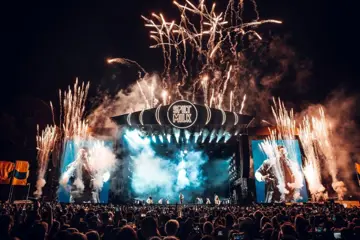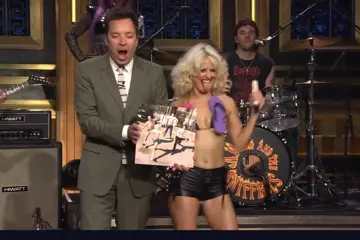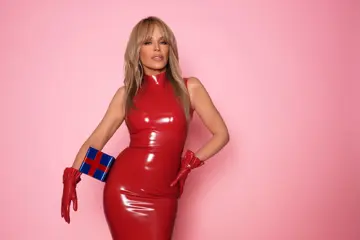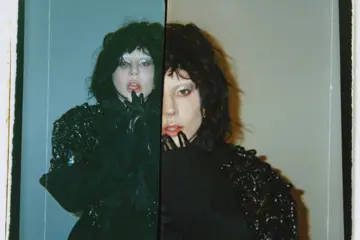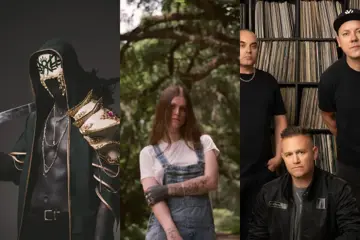I guess you could say JACQUES RENAULT has been busy. Very Busy. What with the co-creation of his label 'On The Prowl', co-curating Let’s Play House (a weekly party over in New York City) and with not only his own solo project, but also his collaborative work under the moniker RUNAWAY.
JACQUES is in Australia at the moment to promote his new music, as well as playing some pretty killer shows alongside some of Australia’s greatest. I sat down to have a chat with JACQUES about his relationship with Future Classic, his experiences of the Australian dance scene, and his work as a curator for many projects.
You headlined with Medlar at Paradiso, which was presented by Future Classic, as part of the Sydney festival. There’s heaps of up and coming Sydney talent, what with Touch Sensitive and Wave Racer playing too. So what have your experiences of the local Australian dance scene been like compared to that of New York?
Well, the shows are a little bit bigger here. I have been very lucky the past couple of times, particularly in Sydney and with Future Classic. Last time I was at the Opera House, and before that Civic, and there’s definitely a great following and a lot of people that definitely come out to all of the shows. I enjoy coming here. I wouldn’t say it’s hard to compare to New York, say example with the states here, but it’s a little different where New York has similar things with bigger events and a lot of smaller things, and I of course do both.
It’s similar in that people come out, and it’s also different in that there’s different sized venues and different kinds of talent that come through. It always seems to be a bit warmer here. For whatever reason, I hate saying that but I enjoy it. It’s part of the pluses of travelling; experiencing different cultures and ways of clubbing, and you can’t really compare one with the other, it’s just a different experience. It makes me enjoy travelling and seeing it all actually.
Future Classic are an integral playmaker in the Australian dance scene, particularly as of late. So, what made you decide to work with Future Classic?
I’ve always been a fan of Future Classic. We’ve had an ongoing relationship now for 5 or 6 years, maybe even longer, and it just seemed like a natural fit. When we first started talking about touring, and coming back, and just of course my experience with the crew and the family, it’s really become a natural thing, and I know I’m going to enjoy it.
I get to spend some time in Sydney, and meet new people and see old friends, so it’s been super fun working with them, and also for all of us to grow as either a label or as artists; I’ve just enjoyed seeing everyone grow and how the music changes and it’s in that natural progression. And they’re very family based, you see the same friends come through, and we all kind of connect and have nothing but positive things to say, and it’s always a good trip, you know.
So, they’re presenting their own stage at Laneway Festival this year, which has probably become one of the biggest Australian festivals. Do you think that this is an indicator that the label is moving in a bigger direction?
Similar to what I was saying before, everyone’s progressing and taking shape. I think all of us, in many ways, just latch on to what we’re interested in, or just get excited about seeing how things develop. Of course we all want to be big, and we all want to be successful in what we do, but I think the real success could be just something that you’re passionate about actually is appreciated by more and more people, so to see your brand, like Future Classic for example, I’d hope it’s everyone’s goal to want to have attention and for everyone to appreciate your music.
So the more the merrier, I think, it’s just something that you would hope you would set a goal for. I don’t know if Future Classic set a goal for themselves. I think they just are really genuine about what they like and they’re passionate about their work and from the get go they have their own little thing going on. They know what they like and how they want to produce. It’s only been growing, and I’ve only seen it grow over the past few years that I’ve been working with them.
I guess that similarly, you’re the “jack of all trades” in that you’ve got your Runaway and Let’s Play House projects, and you’ve got your label On the Prowl as well. What made you begin On the Prowl?
When Marcus and I were doing our Runaway project, we had worked with a couple of different labels, and we were kind of thinking with our new music that we were really passionate about, that we should actually try our own output. The first couple of releases were all Runaway, and then we started for fun, you know, signing friends, and releasing records and remixes with other friends, and it was just a natural progression. It’s not like we broke ties with any labels we’d worked with, we were just doing more and more, and it seemed to be the way of doing things.
I like these relationships I have with different friends, and it’s fun to do stuff with different people. We’re lucky that we have the resources to do it. I have distribution, and good relationships with those people, and I think it’s kind of a trade these days, I mean I obviously think there’s bigger labels than others, but there’s enough out there where if you do it enough, or good enough, you’ll get noticed and keep going.
I know you’ve described working on On the Prowl as more of a curator’s role, so you have more creative control. Do you feel like that’s a better way to go, rather than being like a “corporate” label?
I think with On the Prowl, you kind of have to. It would be really hard to pigeonhole yourself into doing just one thing. If I was just going to release Runaway on On the Prowl, and that was it, I think it would work. But I think for fun, or in general, it’s really nice to just branch away.
With Let’s Play House, we started with a Runaway track, then we had a couple of remixes from friends, then we signed on other talent, and it took I think, 2 years until I actually released my first solo single on the label, and then another year for another single. I like curating. I like music that my friends make. It is still a bit my personality I guess, or my direction with Nik, or with Marcus. It’s just another way of making your creative outlet.
Do you feel that this experience has given you a better understanding of the music that you, as a solo artist, want to make?
Yeah, I joke that I listen to more bad music than good music, because there’s so much out there. I think it’s important to listen to what other people are doing, I think it’s important to share music, and give feedback; you can take it or leave it, you don’t have to really listen. What I choose to play shapes what I want to make because I want to make music that I want to play.
It would be silly for me to make stuff that I didn’t want to play, so of course, over the years, my stuff has changed, my directions changed. It depends what kind of set I’m playing too, or who’s playing before me, who’s playing after me and that will determine how I’m going to set up. There’s nothing I do that’s predetermined, I kind of like to wing it, and just have a little freedom.
I know that you’ve said before that you used to spend a lot of time in record stores. You must have a huge collection…
I have a lot of records. I don’t need to buy anymore. I still buy plenty of new records, but I know they get expensive. But as far as used records go, I still do that just to get out of the house as a break. I joke that I should just do record shopping at home because I have plenty and I don’t go through them enough.
So what do you do now to discover new music? Do you still do a lot of record store shopping?
Yeah, I discover a lot of new music through things that my friends send me, strangers too, I get demos, and from my favourite record stores, I get the email updates. I first and foremost, look at what vinyl’s coming out and discover new labels and stuff like that.
So you’re set to release your track “The Fake Out” on the 17th of February, as an official release. I’ve noticed that you don’t pigeonhole yourself to one genre. You explore deep house, house and you predominantly look at disco as well, so what would you say has influenced the direction of your new track?
This was definitely a heavy hitter. I was kind of working on a couple of tunes at the same time, and of the tunes of that group that I was working on, this one just really stood out, , and it was in my heavier sets. As you said, I’ve done some disco stuff, and heavier house-ier things, but this is definitely going for the more darker, bigger room idea. And it works really well, I’m happy that it’s got some good attention.
Do you feel that having a diverse palette of sounds is essential in this world where the music industry seems limitless, what with the internet and particularly, Soundcloud becoming huge sources of output?
My early influences were the early house pioneers. As the 90’s hit, everything was very specific, like “I only do techno”, or “I only do this kind of house”. I think after experiencing this, I wanted to branch away and I wanted to be eclectic. People like Too Many DJ’s, going out in the early DFA days, or Optimo for example, really made you experience the beauty of being eclectic and being a good DJ.
They showed how to mix it up and to cover a bunch of different genres and actually make the listener be like “What’s he going to play next?” so that it’s not so predictable. It’s a big reason why I liked the early 2000’s, with what people were challenging themselves to do. It was why I went to record stores everyday, and why Beats in Space to this day is so successful - one of my favourite radio shows - and it’s the perfect example of being eclectic.
Words by Caitlin Medcalf



